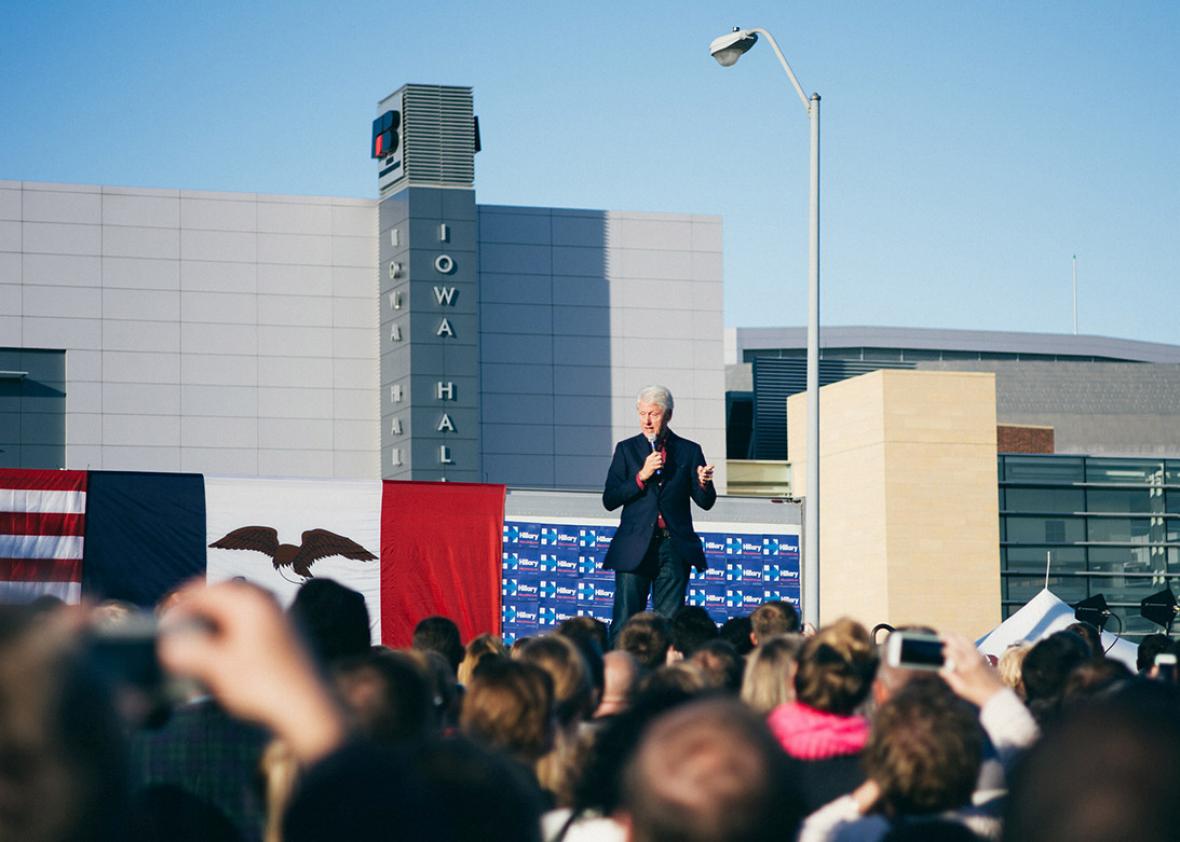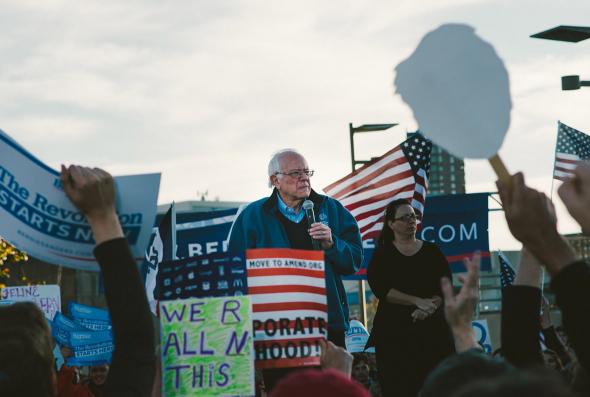We remember the Iowa Jefferson-Jackson Dinner because of the speeches. In 2007, a still-struggling Sen. Barack Obama gave the speech that defined his message—“change we can believe in”—and transformed his campaign. But speeches are just a small part of this event. Overwhelmingly, the Iowa Jefferson-Jackson Dinner is a test run for campaign infrastructure. Can you bring supporters to a full day of events? Can you use that to expand your reach in the state? Can you demonstrate enthusiasm by bringing those supporters to the dinner itself, where people holler and cheer for candidates like spectators at a game (or teenagers at a student government conference)?
The answer for the two largest campaigns in the state—Hillary Clinton’s and Sen. Bernie Sanders’—was a clear yes. Saturday morning, Clinton volunteers manned posts around the convention area, cheering every car that drove into downtown Des Moines or every person who walked by. Referencing Katy Perry’s appearance that afternoon, a young man in a shark costume danced for those passing by, while a group of volunteers waved a cardboard cutout of Clinton.
That afternoon, both campaigns held large rallies at sites around downtown. (Martin O’Malley also held a “rally,” where little more than a hundred people heard a brief speech and listened as he played the guitar.) An estimated 4,000 people gathered outside of the Hy-Vee Hall—where Iowa Democrats held the actual dinner that evening—to see Katy Perry perform for the Clinton campaign. Opening, of course, was Bill Clinton, who made an impassioned pitch for Hillary as the president America needs to protect and defend progressive gains from the Republican Party. “Stop rewarding the strategy of destruction,” he said, urging the crowd to oppose GOP antics in Congress. President Clinton wasn’t just an advocate; he also showcased his much-heralded political skills to deal with an animal rights protester. “We got it. Will you please quit now?” he said to the man, who was moved offstage. Clinton turned then to the crowd and praised the heckler, making him a contrast to the Republican Party. “At least that guy is for something. He didn’t come here to bad-mouth anybody.”

Photo by Jamelle Bouie
(Here, it’s worth noting that if she’s the nominee, Clinton will have the unusual advantage of campaigning with a popular ex-president, a well-liked sitting vice president, a decently liked outgoing president, and a popular first lady.)
Just a few blocks away—across the river that divides downtown Des Moines—Sanders held his event. Smaller than Clinton’s gathering—and much smaller than the usual Sanders rally, which draws thousands and thousands of people—it was almost low-key compared to Clinton’s quasi-festival atmosphere. Still, it was lively. Outside the main space, volunteers collected signatures and information from attendees—to contact them later—while small vendors set up tables to sell assorted swag, including tracts on socialism. A plane flew over the crowd flying a “Feel the Bern” sign. A preacher revved up the crowd, while a drum line and step team of young black Americans practiced in preparation for the march to the dinner itself. When Sanders finally arrived, he gave a shortened and modified version of his stump speech, calling for a country where “billionaires” couldn’t “buy elections.”
Sanders didn’t say much about Clinton, but that wouldn’t hold. At the dinner itself—cheered on by a large section of extraordinarily enthusiastic supporters (“Feel the Bern” was a regular refrain, at times drowning out everything in the vicinity)—Sanders went on the attack for the first time of his campaign. “[L]et me be clear about the current trade deal that we are debating in Congress,” he said, referencing the Trans-Pacific Partnership. “It is not now, nor has it ever been, the gold standard of trade agreements. I did not support it yesterday. I do not support it today. And I will not support it tomorrow.”
This was just the beginning. On same-sex marriage, climate, Wall Street, and the Iraq war, Sanders—following Obama’s script of eight years earlier—hit Clinton on principle. “Today, some are trying to rewrite history by saying they voted for one anti-gay law to stop something worse,” he said, criticizing Clinton’s remarks to Rachel Maddow on the Defense of Marriage Act. “Let us be clear. That’s just not true.” He continued: “It gives me no joy to say that I was largely right about the war. I am proud to tell you when I came to that fork in the road I took the right road even though it was not the popular road at the time.”
The message was simple: Hillary Clinton isn’t a real progressive. Not like Sanders, at least. And if elected, there’s no guarantee she’ll stick with you.
Since starting his campaign, Sanders has been single-minded in his focus on issues and ideas. Which makes this a real tonal shift. Bernie is going negative, and it could pull skeptical Democrats—who still aren’t sure on Clinton—as much as it could alienate him with the broad Democratic middle he needs to win beyond Iowa and New Hampshire.

A parade of Sanders supporters walks toward the convention center for the dinner.
Photo by Jamelle Bouie
O’Malley also had words for Clinton (and Sanders, for that matter), selling himself as a leader of “action, not words,” who isn’t a “weather vane that shifts its position every time the winds change.”
Clinton just gave her stump speech. That’s all. No mention of her performance before the Benghazi committee; no new policies or ideas; no mention of her opponents. If you’ve heard Clinton at any event in the past six months, you heard her at the Jefferson-Jackson Dinner. She was the only candidate to say “black lives matter,” and she pledged to “fight” for a country where “there are no ceilings for anyone” and “where a father can tell his daughter, ‘You can be anything you want to be, including the president of the United States of America.’ ”
Then again, if you’re Clinton, there’s no reason to switch gears. Iowa polls are close, but she—like Sanders—has built a formidable operation, informed by her 2008 loss to Obama. She’s behind in New Hampshire, but again, Team Clinton is working at all cylinders. And nationally, Clinton is far ahead of Sanders, with a sturdy electoral firewall in states like South Carolina and Nevada, where she holds large majorities with black and Latino Democrats.
The lesson from this Jefferson-Jackson Dinner, in other words, is that Clinton doesn’t think she’s going to lose and doesn’t plan to start a serious fight with her only real opponent. Of course, Clinton tried this front-runner strategy in 2008, and it failed. Miserably. However, 2016 isn’t 2008, and at this juncture, there’s no sign that Sanders can reach behind his base in the left wing of the Democratic Party. But if he can, then—once again—Clinton might regret this choice to play it safe.
